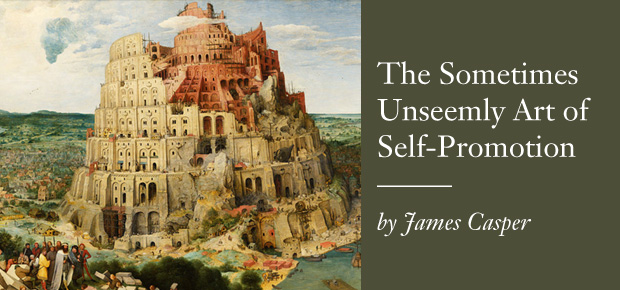
There is nothing new about writers promoting themselves and their writing. Writers have only recently had television talk shows, Internet, and Facebook, but they have always found ways of bringing themselves to public attention.
Notoriety was one way: Sir Thomas Malory is reported to have written Le Morte d’Arthur while in prison for a variety of crimes, both petty and sensational. Two centuries later Sir Thomas More wrote A Dialogue for Comfort while imprisoned in the London Tower awaiting execution. (N.B. strategies not recommended for Ignatius Press novelists!)
Otherwise, with nothing electronic or digital in the picture, friends in high places could do it; tours on the highways and byways could do it; posters and handbills could do it; hanging around with notoriously drunken companions could do it. Whatever the risks, whatever it was, and whatever worked, writers have done it. The creative arts have seldom been a place for recluses and wallflowers. Reputations were built in the manner of cathedrals, from elevated platforms, often self-erected.
 Chaucer did it by snagging positions at the English Court and passing his poems around with targeted dedications. Shakespeare flattered patrons. If we knew much of anything about Homer from two thousand years before, we would probably discover he did the same. Benjamin Franklin charmed Paris as a diplomat.
Chaucer did it by snagging positions at the English Court and passing his poems around with targeted dedications. Shakespeare flattered patrons. If we knew much of anything about Homer from two thousand years before, we would probably discover he did the same. Benjamin Franklin charmed Paris as a diplomat.
Closer to the present, Charles Dickens travelled twice to America to put on what amounted to a roadshow of dramatic readings. He got as far west as St. Louis. Oscar Wilde, who had yet to write much of anything, traipsed from one American city to another, lecturing with lily in hand and speaking with a languid, almost lisping drawl. He is reported to have celebrated St. Patrick’s Day in St. Paul, Minnesota as part of a program also featuring Archbishop John Ireland. The year was 1882. Later he showed up in Omaha. Everywhere he went he was lampooned and ridiculed. He did not in the least mind. As someone observed long after his time, there is no such thing as bad publicity.
Mark Twain appeared publicly as a ‘cracker barrel’ philosopher. He affected a Southern/Midwestern drawl that was less truly Midwestern than it was how Eastern folk thought Midwesterners would sound. He was very good at it, though he lived much of his life near the East Coast, and is buried in Upstate New York. He lived far from his beloved Mississippi for so long that he once journeyed there to refresh his memory of how things were in his distant youth.
Hollywood and the emerging film industry on both sides of the Atlantic created new opportunities. Sinclair Lewis, Ernest Hemingway, John Steinbeck, and even William Faulkner all spent time in Hollywood, hobnobbed with film celebrities, and honed their images, sometimes to the detriment of their writing, their health, and their reputations. Among America’s first Nobel Prize in Literature winners, arguably only Pearl Buck and T. S. Eliot were not alcoholics.
In search of reputation and readership, other writers crisscrossed oceans. Robert Frost settled for a time in Beaconsfield, village home of G. K. Chesterton. Henry James, an American, sometimes seemed more British than the British and more at home there. T. S. Eliot, born in St. Louis, became a London bank employee. Rudyard Kipling had a home in Vermont. British poet W. H. Auden became a United States citizen. Robert Louis Stevenson, perhaps fleeing notoriety more than cultivating it, died on a mountainside in Samoa.
Then there is the iconic Hemingway, perhaps history’s most photographed writer, with perfectly trimmed beard on the covers of both Life magazine and of Time and on a U.S. postage stamp; photographed with Fidel Castro in Cuba, bullfighters in Pamplona, and champion boxers ringside; dead of a self-inflicted gunshot. Fidel still lives. The paths of self-promotion do not always end well.
Were it not for Audrey Hepburn and Breakfast at Tiffany’s, we would be well along in forgetting Truman Capote, an occasional visitor on the Johnny Carson show. Urban legend is that he died at the home of Johnny’s ex-wife, of an apparent drug overdose. In his later years, he struggled to write much of anything. Gore Vidal openly spurned television, but seldom shied from being televised. His infamous 1968 debate with William Buckley is available these days on YouTube. This will probably be watched long after his novels are forgotten.
In contrast to all this, there is Jesus Christ whose public life we especially ponder during the Lenten season. Among my favorite New Testament stories are those in which Christ, having done something much more remarkable than writing a novel, instructs his followers to tell no one, and then goes off somewhere to be alone. You cannot sell many books that way, and yet people are still purchasing bibles, the all-time best-seller.
Of course Christ had his own reasons for embracing obscurity and avoiding self-promotion. Putting on a show, taking several bows, and performing an encore was not in his lesson book, nor had it been his Father’s way. Christ did not hang around for applause. He let his words speak for him, while leaving it to his followers to speak for his words, foremost among them Saint Paul who had to be knocked off his high horse before he could see the truth of it all.
Christ was not a writer, albeit he made creative use of parables, and was in that sense an accomplished storyteller who could give a lesson pointing toward a moral without being polemical. The story of his confrontation with the men bent on stoning the woman accused of adultery has an especially memorable twist when he paused to make marks in the sand with a stick. This may be the only moment when he ever wrote anything. I like to think those marks, defying the fate of all things written in sand, still exist somewhere in Palestine today, awaiting discovery by a subsequent Indiana Jones.
Where does all this leave a writer in search of readers while making marks of his in what may well amount to sand? It is challenging to imagine Christ autographing copies of the New Testament, walking out upon a stage to read snippets, appearing on television talk shows, networking, ‘Facebooking’, keeping a blog, cultivating a persona, and – to paraphrase T. S. Eliot’s Prufrock – preparing a face to meet the faces that he meets.
That much said, I often turn to poets for perspective in moments of uncertainty, in this instance “To a Louse” by Robert Burns:
O wad some Power the giftie gie us
To see oursels as ithers see us!
It wad frae mony a blunder free us,
An’ foolish notion:
What airs in dress an’ gait wad lea’e us,
An’ ev’n devotion!
What do I conclude from this?
The world admires pure creation; the ability to fashion something out of nothing speaks for itself, in its own words. God called it a world.
Writers fashion a terrarium with moss, a few cliché mushrooms, and some colorful plastic rocks – a novel. This may require promotion.






michellemmead
March 18, 2014 at 12:59 am
Great article!
Ignatius Press Novels | Enthusiasm Sells Books
April 14, 2014 at 12:23 pm
[…] authors are often put into this position. (See James Casper’s post on this subject here, and Dorothy Cummings McLean here.) They can’t merely write a book, send it to the publisher, and […]